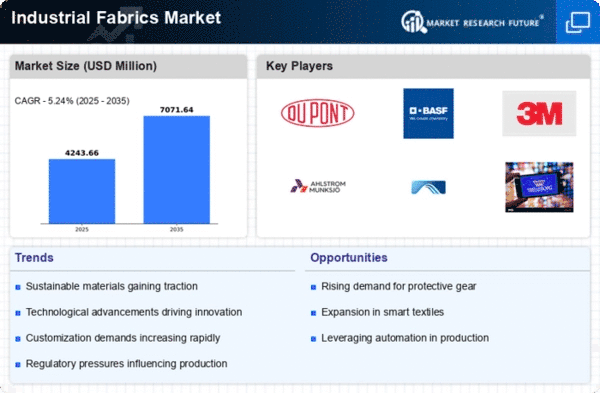Top Industry Leaders in the Industrial Fabrics Market

The industrial fabrics market, a multi-billion dollar tapestry woven from diverse applications, pulsates with fierce competition. From flame-retardant apparel to conveyor belts, these specialized textiles drive industries ranging from construction to filtration. Unveiling this landscape requires dissecting the strategies of powerhouses, understanding the threads influencing market share, and catching the recent stitches in industry news.
Strategic Stitches Shaping the Market:
Diversification and Specialization: Weaving giants like Freudenberg Group and Milliken & Company are diversifying their portfolios, catering to niches like medical textiles and advanced composites. Meanwhile, regional players like Shandong Weiqiao Textile Group Co., Ltd. are stitching expertise in specific segments like filtration fabrics, gaining a competitive edge.
Innovation Through the Loom: Technological advancements are rewiring the market. Companies like GORE Fabrics Division of WL Gore & Associates, Inc. are pioneering cutting-edge materials with self-healing properties and enhanced breathability. Others like Albany Engineered Composites are weaving nanotechnology into their fabrics, unlocking superior strength and lightweight benefits.
Sustainability Takes Center Stage: Eco-conscious threads are being woven into the market fabric. Lenzing AG and Unifi, Inc. are leading the charge with sustainable fibers like Tencel™ and Repreve®, minimizing environmental impact and attracting ethically-driven consumers.
Global Expansion: Emerging markets are fertile ground for growth. Reliance Industries Limited and A.T.E. Enterprises Pvt. Ltd. are aggressively expanding their footprints in Asia and Africa, capitalizing on the burgeoning infrastructure and manufacturing sectors in these regions.
Strategic Partnerships and Acquisitions: Collaborative threads bind the market closer. Recent examples include Asahi Kasei Fibers Corporation's partnership with DSM Engineering Materials to develop next-generation high-performance fibers and Berry Global Group, Inc.'s acquisition of Polymer Group, bolstering its position in the nonwovens segment.
Threads Holding Market Share:
-
Cost Competitiveness: Efficient production processes, optimized supply chains, and access to low-cost raw materials are key differentiators in a price-sensitive market.
-
Product Quality and Consistency: Delivering consistently high-quality fabrics with precise properties builds customer trust and repeat business.
-
Innovation and Customization: Ability to tailor fabrics to specific needs and develop cutting-edge solutions keeps players ahead of the curve.
-
Geographical Presence: Being present in key industrial hubs and having robust distribution networks are crucial for market reach.
-
Environmental Footprint: A commitment to sustainable practices and eco-friendly materials attracts sustainability-conscious buyers.
Key Players
Some of the manufacturers operating in the global industrial fabrics market are Forbo International SA (Switzerland), Ahlstrom-Munksjö (Finland), Habasit (Switzerland), TORAY INDUSTRIES, INC. (Japan), ContiTech AG (Germany), Cerex Advanced Fabrics, Inc. (US), W. Barnet GmbH & Co. KG (Germany), DowDuPont (US), Johns Manville (US), and Fitesa SA (Brazil).
Recent Developments:
July 2023: Asahi Kasei announces the development of biodegradable flame-retardant fibers made from plant-derived materials. This innovation addresses sustainability concerns in the fire protection apparel segment.
October 2023: The National Textile Center launches a project to develop smart fabrics for industrial applications, focusing on functionalities like self-cleaning and self-healing.
December 2023: The European Commission proposes a new regulation on sustainable chemicals, potentially impacting the production and use of certain industrial fabrics in the EU.










